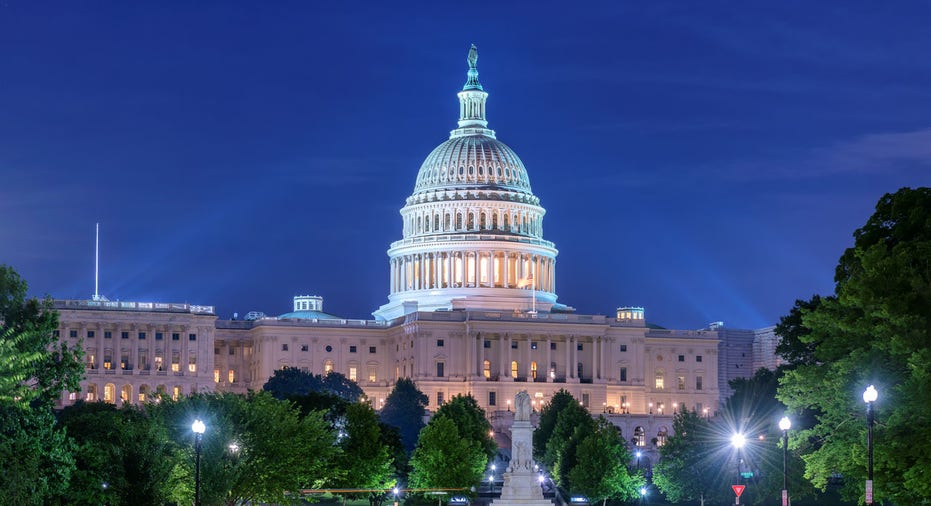Congress votes to raise debt ceiling by $2.5 trillion, narrowly avoiding first-ever default
Here's how the debt limit can impact your personal finances

The House on Wednesday voted in favor of a debt ceiling increase, keeping the federal government out of default until 2023. (iStock)
The House of Representatives voted early Wednesday to increase the federal borrowing limit by $2.5 trillion, temporarily avoiding default and funding the government through early 2023. Now, the bill to raise the debt ceiling is headed to President Joe Biden's desk for final approval.
The measure was approved 221 to 209, with the support of only one House Republican, Rep. Adam Kinzinger of Illinois. It passed a Senate vote along party lines on Tuesday afternoon.
Senate Minority Leader Mitch McConnell, who previously said that Democrats would have to act alone to lift the debt limit, worked with GOP lawmakers to avoid a filibuster and close debate on the Senate floor. This paved the way for Congress to approve the bill with a simple majority.
HOUSE PASSES BIDEN'S BUILD BACK BETTER SPENDING PLAN
Treasury Secretary Janet Yellen previously estimated that the federal government could reach the debt limit by Dec. 15 without action by Congress. If the United States defaults on its financial obligations, consumers could feel the consequences in several ways — from rising interest rates to delayed Social Security checks.
Keep reading to learn more about how the debt ceiling can impact your finances. If you're shopping around for financial products like loans and credit cards, visit Credible to compare offers without impacting your credit score.
CREDIT CARD DEBT SURGED DURING PANDEMIC, SURVEY FINDS
What happens if the debt ceiling is reached?
Raising the debt ceiling doesn't increase government spending. Rather, it allows the Treasury Department to pay for expenses it has already incurred. The vast majority of federal debt currently subject to the debt limit was accrued before the Biden administration, according to the White House.
The U.S. has never defaulted on its debts before — the federal debt limit has been modified about 78 times since 1960, including three suspensions under the Trump administration, according to the Treasury Department. While the debt limit has previously been seen as a bipartisan issue, it's recently become more polarized as GOP lawmakers refuse to support raising or suspending the debt ceiling amid concerns with government spending.
Although Congress voted Wednesday to raise the debt ceiling, it's not a permanent solution. By adding $2.5 trillion to the federal borrowing limit, the government will be able to avoid default for about two years, according to Senate Majority Leader Chuck Schumer. At that time, Congress will need to determine how to address the issue or risk federal default again. If a more permanent solution isn't reached, here are a few things that could happen.
SENATE PASSES TEMPORARY DEBT CEILING INCREASE
The United States' credit rating would take a hit
A significant part of the federal debt comes in the form of securities sold by the Treasury Department, such as bills, notes and bonds. These securities act as revenue to meet the country's financial obligations. Since the U.S. has never defaulted on its debts, Treasury bills and other products are seen as some of the safest investments in the world.
If the U.S. can't repay these debts, there would be significant negative impacts on the country's credit rating. Investing in the American government would not be seen as a secure investment, which could impact federal revenue and cause Treasury yields and interest rates to rise.
"Since US Treasury securities no longer would be risk free, future generations of Americans would pay a steep economic price," according to a September 2021 report from Moody's Analytics.
In contrast, interest rates are currently near record lows on a variety of financial products, including personal loans and private student loans. If you're in the market for any of these products, visit Credible to see your estimated offers for free.
SENATE DEMOCRATS URGE BIDEN ADMIN TO SIMPLIFY MILITARY STUDENT LOAN FORGIVENESS
Social Security checks, CTC payments and federal paychecks could be delayed
The government relies on the federal debt to meet its financial obligations, including the ones beholden to American taxpayers.
If the debt ceiling is ever reached, it could cause indefinite delays in Social Security checks, child tax credit (CTC) payments and federal paychecks, such as those for military service members, as well as other expenses. This would leave millions of American families without the income on which they rely.
SENATE MAJORITY LEADER CHUCK SCHUMER CALLS ON BIDEN TO EXTEND STUDENT LOAN FORBEARANCE
Mortgage rates would rise
When interest rates on federal investments rise, mortgage rates follow suit. Moody's Analytics determined that going into default would cause mortgage rates to spike, "at least until the debt limit is resolved and Treasury payments resume." At that point, though, the damage would be done, and rates may never fall back to where they were previously, the report continued.
Homeowners and prospective buyers have been taking advantage of historically low interest rates for the past few years. But that would come to an abrupt end if the U.S. defaults on its debt. Although the debt ceiling issue has been temporarily resolved until 2023, now is still a good time to lock in a low interest rate for mortgage purchase and refinance loans.
Visit Credible to compare mortgage rates across multiple lenders, so you can get the lowest rate possible for your financial situation.
MILLIONS OF AMERICANS FEAR MISSING DEBT PAYMENTS, NEW YORK FED REPORTS
Have a finance-related question, but don't know who to ask? Email The Credible Money Expert at moneyexpert@credible.com and your question might be answered by Credible in our Money Expert column.




















